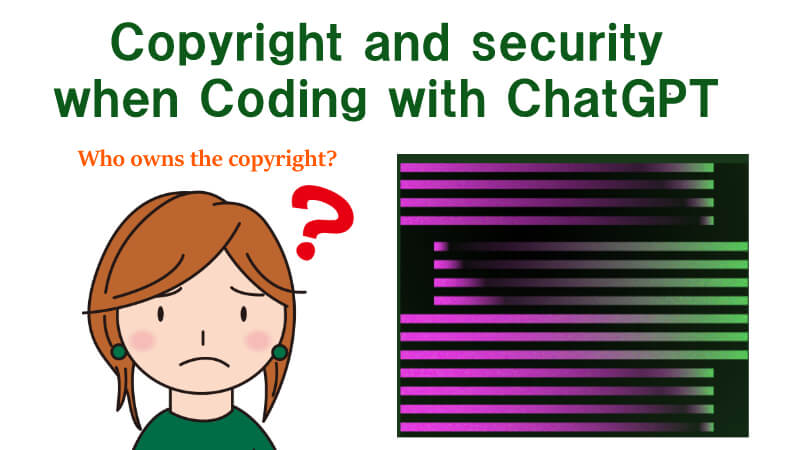GhatGPT is a very useful tool, but using it for commercial purposes as it is may be risky. Sending important information to ChatGPT may also be risky.
I’ve looked into the copyright and security area of ChatGPT and will share it with you.

We want to use the tool with confidence.
If you are interested in this area, please read on.
Regulations on AI tools have not kept pace with the speed of development
ChatGPT improves its performance by learning, but the data on which the training is based are those that exist on the Web.
What happens to copyright in these cases? I’m curious.
I would like to get the clear answer, but my impression is that copyrights for AI tools are not yet in place.

It means that technology is evolving so fast that the rules can’t keep up.
In this situation, not long ago, GitHub Copilot, a tool trained using data on GitHub, was the subject of a class action lawsuit. The companies sued were Microsoft, GitHub, and OpenAI.
To use code on GitHub, you generally need to include the author’s credit information.
However, data obtained via AI tools do not have this obligation. This is an infringement of copyright, and the company was sued.
I am curious about this area because Microsoft, GitHub, and OpenAI are also involved in the development of GhatGPT.
In addition, news on this lawsuit is that as of January 2023, three companies have requested that the lawsuit be dismissed. The statutory hearing to dismiss the lawsuit will be held in May, and the outcome is not yet known.
Below is the reference material on this matter.
Copyright of ChatGPT
This is the situation, but what do ChatGPT’s terms and conditions say about copyright?
Let’s check the actual terms and conditions: as of March 24, 2023, the copyright reads as follows
[ChatGPT terms and conditions]
You may provide input to the Services (“Input”), and receive output generated and returned by the Services based on the Input (“Output”).
(omission)
Subject to your compliance with these Terms, OpenAI hereby assigns to you all its right, title and interest in and to Output. This means you can use Content for any purpose, including commercial purposes such as sale or publication, if you comply with these Terms.
References:https://openai.com/policies/terms-of-use
As mentioned above, in terms of ChatGPT’s terms and conditions, the copyright belongs to the user.
However, the following statement is also included in the terms and conditions
Copyright Complaints. If you believe that your intellectual property rights have been infringed, please send notice to the address below or fill out this form. We may delete or disable content alleged to be infringing and may terminate accounts of repeat infringers.
References:https://openai.com/policies/terms-of-use
It could be read as a potential copyright complaint…

Incidentally, a little higher up, there is also a clause prohibiting class actions.
Conclusion: The code looks good to use as a reference.
As you can see, copyright is not a problem under the terms of the agreement, but there are still some unresolved issues. I think it is up to each individual to decide what to do.
My conclusion is that “there seems to be no problem, but I had better not copy the whole thing and use it for commercial purposes.
However, at this point, I don’t think that the programming code created by ChatGPT can be used as it is in a real project.
You do not need to worry about copyright as long as you use ChatGPT’s answers as a reference.
However, it may be necessary to be careful about HTML coding, as it can be accurate enough to be used as is.
Care must be taken with the data to ChatGPT
Please be careful about the data you send to ChatGPT when you ask questions, etc.
A supporting article describing how data sent to ChatGPT is used states the following
- Data obtained through the API is not used for training
- When using consumer services (ChatGPT or DALL-E), the data may be used to improve the model
In other words, it appears that data may be used if ChatGPT is used normally. However, in that case, it states that personally identifiable information will be deleted. It also specifies that “a small sampling of data” should be used and that “take very care to use” when using it.
If you use personal data as it is, you will be in trouble, so I think they are doing a good job of handling this area.
However, you should be careful not to send important information.
OpenAI revealed that a bug on March 24 compromised the personal and credit card information of some ChatGPT users to other users of the service.

When we use something new, we need to be reasonably careful.
By the way, the support article states that if you do not wish to use the data, you must fill out a form. If you are concerned, check the article.
You can request to opt-out of having your data used to improve our non-API services by filling out this form with your organization ID and email address associated with the owner of the account.
References:https://help.openai.com/en/articles/5722486-how-your-data-is-used-to-improve-model-performance
Please note that the terms and conditions in this area may change again. If we become aware of them, we will update this article, but please check the original article before making any decisions.
In the end
My conclusion is
- Although copyright does not seem to be an issue under the terms of the agreement, it would be better to use it only as a reference and not in its entirety.
- I shouldn’t send important data to ChatGPT.

Pay attention to the important points and use AI tools comfortably and conveniently.
In this article, I have written about ChatGPT’s conventions-related matters, but if you want to write code using ChatGPT, please refer to other articles as well.
I also have a separate article on how to create a web application with ChatGPT and Laravel.



